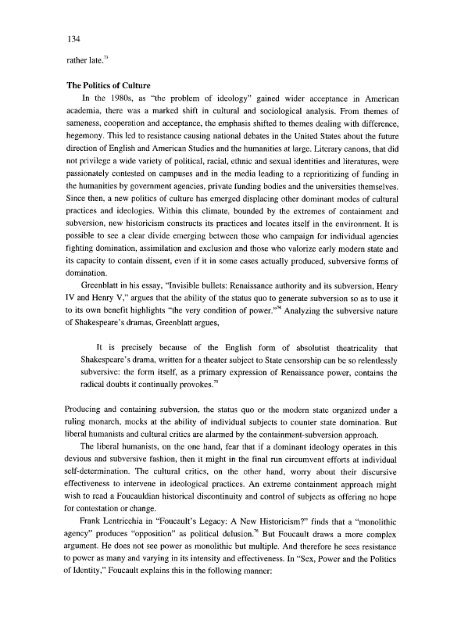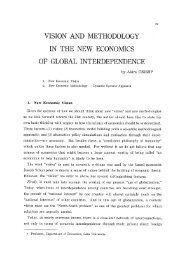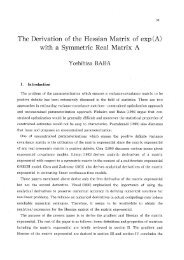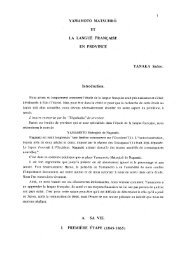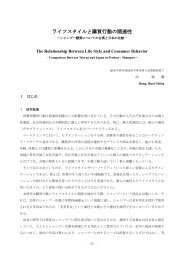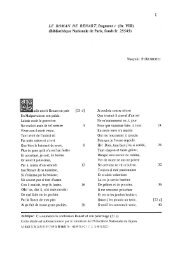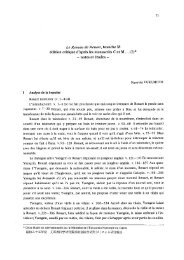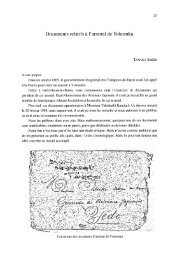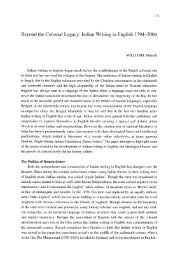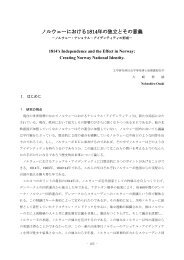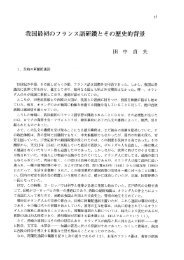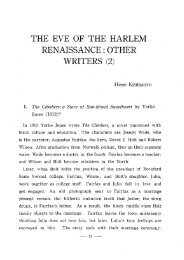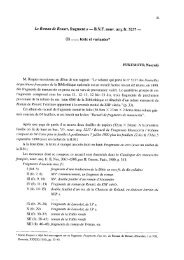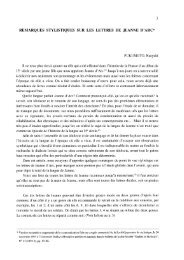New Historicism and Literary Studies - Soka University Repository
New Historicism and Literary Studies - Soka University Repository
New Historicism and Literary Studies - Soka University Repository
Create successful ePaper yourself
Turn your PDF publications into a flip-book with our unique Google optimized e-Paper software.
134<br />
rather late.73<br />
The Politics of Culture<br />
In the 1980s, as "the problem of ideology" gained wider acceptance in American<br />
academia, there was a marked shift in cultural <strong>and</strong> sociological analysis. From themes of<br />
sameness, cooperation <strong>and</strong> acceptance, the emphasis shifted to themes dealing with difference,<br />
hegemony. This led to resistance causing national debates in the United States about the future<br />
direction of English <strong>and</strong> American <strong>Studies</strong> <strong>and</strong> the humanities at large. <strong>Literary</strong> canons, that did<br />
not privilege a wide variety of political, racial, ethnic <strong>and</strong> sexual identities <strong>and</strong> literatures, were<br />
passionately contested on campuses <strong>and</strong> in the media leading to a reprioritizing of funding in<br />
the humanities by government agencies, private funding bodies <strong>and</strong> the universities themselves.<br />
Since then, a new politics of culture has emerged displacing other dominant modes of cultural<br />
practices <strong>and</strong> ideologies. Within this climate, bounded by the extremes of containment <strong>and</strong><br />
subversion, new historicism constructs its practices <strong>and</strong> locates itself in the environment . It is<br />
possible to see a clear divide emerging between those who campaign for individual agencies<br />
fighting domination, assimilation <strong>and</strong> exclusion <strong>and</strong> those who valorize early modern state <strong>and</strong><br />
its capacity to contain dissent, even if it in some cases actually produced, subversive forms of<br />
domination.<br />
Greenblatt in his essay, "Invisible bullets: Renaissance authority <strong>and</strong> its subversion, Henry<br />
IV <strong>and</strong> Henry V," argues that the ability of the status quo to generate subversion so as to use it<br />
to its own benefit highlights "the very condition of power."74 Analyzing the subversive nature<br />
of Shakespeare's dramas, Greenblatt argues,<br />
It is precisely because of the English form of absolutist theatricality that<br />
Shakespeare's drama, written for a theater subject to State censorship can be so relentlessly<br />
subversive: the form itself, as a primary expression of Renaissance power, contains the<br />
radical doubts it continually provokes.75<br />
Producing <strong>and</strong> containing subversion, the status quo or the modern state organized under a<br />
ruling monarch, mocks at the ability of individual subjects to counter state domination. But<br />
liberal humanists <strong>and</strong> cultural critics are alarmed by the containment-subversion approach.<br />
The liberal humanists, on the one h<strong>and</strong>, fear that if a dominant ideology operates in this<br />
devious <strong>and</strong> subversive fashion, then it might in the final run circumvent efforts at individual<br />
self-determination. The cultural critics, on the other h<strong>and</strong>, worry about their discursive<br />
effectiveness to intervene in ideological practices. An extreme containment approach might<br />
wish to read a Foucauldian historical discontinuity <strong>and</strong> control of subjects as offering no hope<br />
for contestation or change.<br />
Frank Lentricchia in "Foucault's Legacy: A <strong>New</strong> <strong>Historicism</strong>?" finds that a "monolithic<br />
agency" produces "opposition" as political delusion.76 But Foucault draws a more complex<br />
argument. He does not see power as monolithic but multiple. And therefore he sees resistance<br />
to power as many <strong>and</strong> varying in its intensity <strong>and</strong> effectiveness. In "Sex, Power <strong>and</strong> the Politics<br />
of Identity," Foucault explains this in the following manner:


